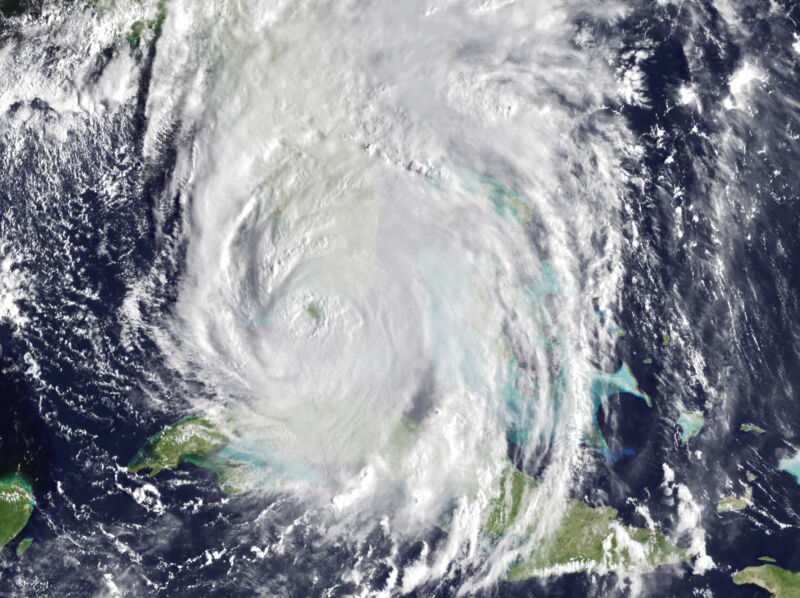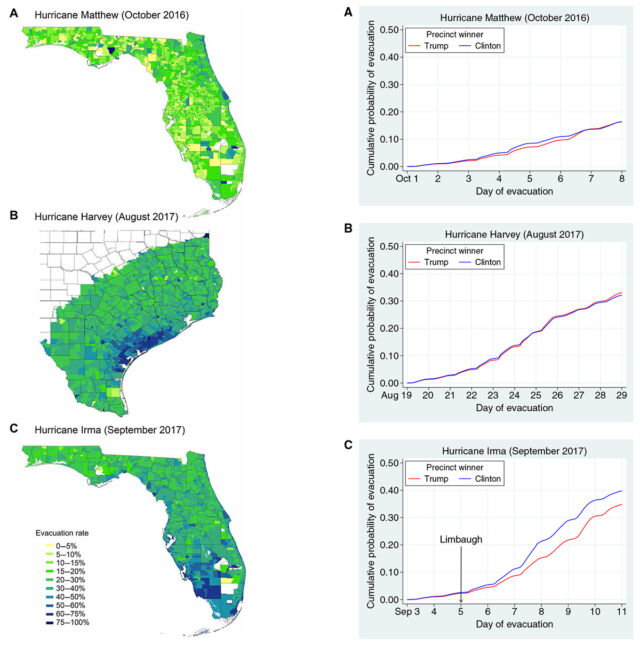
Before Hurricane Irma hit Florida in 2017, radio entertainer (and Florida resident) Rush Limbaugh falsely ranted that landfalling hurricanes are “never as strong as they’re reported,” claiming that life-saving forecasts are exaggerated “to advance this climate change agenda.” Beyond his radio audience, the comments generated a fair amount of news coverage. Yet Limbaugh evacuated his beachfront mansion a few days later.
Given the cultural polarization about certain scientific facts, it’s fair to wonder if these irresponsible falsehoods had a discernible impact on evacuations. UCLA’s Elisa Long, Keith Chen, and Ryne Rohla used a phone-location dataset to find out. They compared evacuations for Irma to those in Texas for Hurricane Harvey and to Florida’s 2016 Hurricane Matthew.
The dataset includes anonymized locations from millions of phones, so it requires some simplified processing. Each phone’s home location is defined by its most common location in the week previous to the first hurricane alert. Then, for a window of time around the hurricane, evacuations are determined by a change in location that lasts at least 24 hours.
Each home location is also assigned to its voting precinct. So based on the results of the 2016 presidential election, the researchers were looking for a correlation between evacuation rates and the political tilt of the precinct.
Comparing Harvey evacuations in the Houston area to Matthew and Irma evacuations in Florida, Irma stands out. The evacuation rate seems significantly lower in precincts where a greater share of votes went to Donald Trump. Overall, about 37 percent of the phones in Florida were recorded as evacuating, but these correlations indicate something like a 7-11 percent difference in the evacuation rate based on vote. There’s no significant pattern like that in the other two hurricanes that were examined.

The researchers looked for some other correlations to see if the political connection could be a coincidence. But they say things like income, education level, and distance from the coast don’t explain the pattern. Given that the timing of the divergence lines up with Rush Limbaugh’s comments and the ensuing media coverage, the researchers draw a pretty strong conclusion that this “illustrates a large behavioral consequence of science denialism”.
It’s probably fair to say the data are consistent with their hypothesis, but demonstrating a causal link is difficult. The researchers point to previous surveys that identified some political/ideological differences in attitudes about evacuation in Florida (but not in Texas). That doesn’t come through in the 2016 Hurricane Matthew data for Florida, but that dataset also isn’t quite as ideal. It includes about 70 percent fewer phones (although 378,000 is still a lot) and an overall evacuation rate that was less than half of Irma’s because fewer came from counties with hurricane warnings.
The dataset may be unique, but that means historical context is limited, making it hard to be confident that a given observation is truly novel. Still, a gap in evacuation rates along party lines is disturbing and worthy of study. Partisan divides about climate change in Florida tend to soften once the topic turns to practical decisions about dealing with sea level rise. Hurricane safety, too, needs to stay grounded in reality—and not talk radio.
Science Advances, 2020. DOI: 10.1126/sciadv.abb7906 (About DOIs).
https://arstechnica.com/?p=1705521

